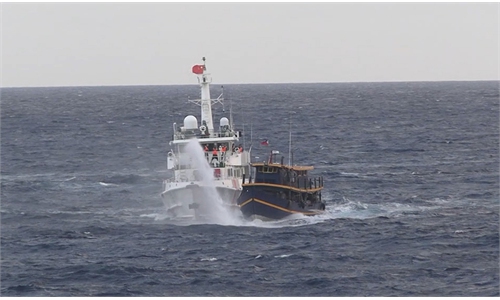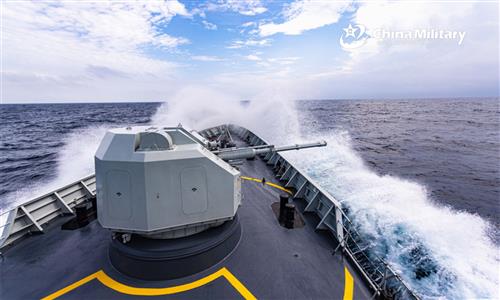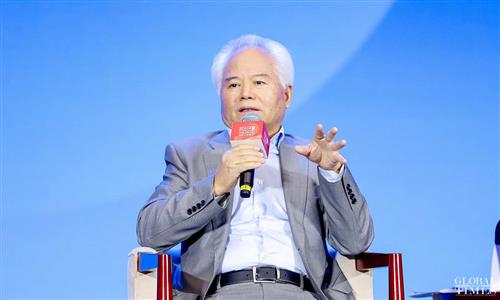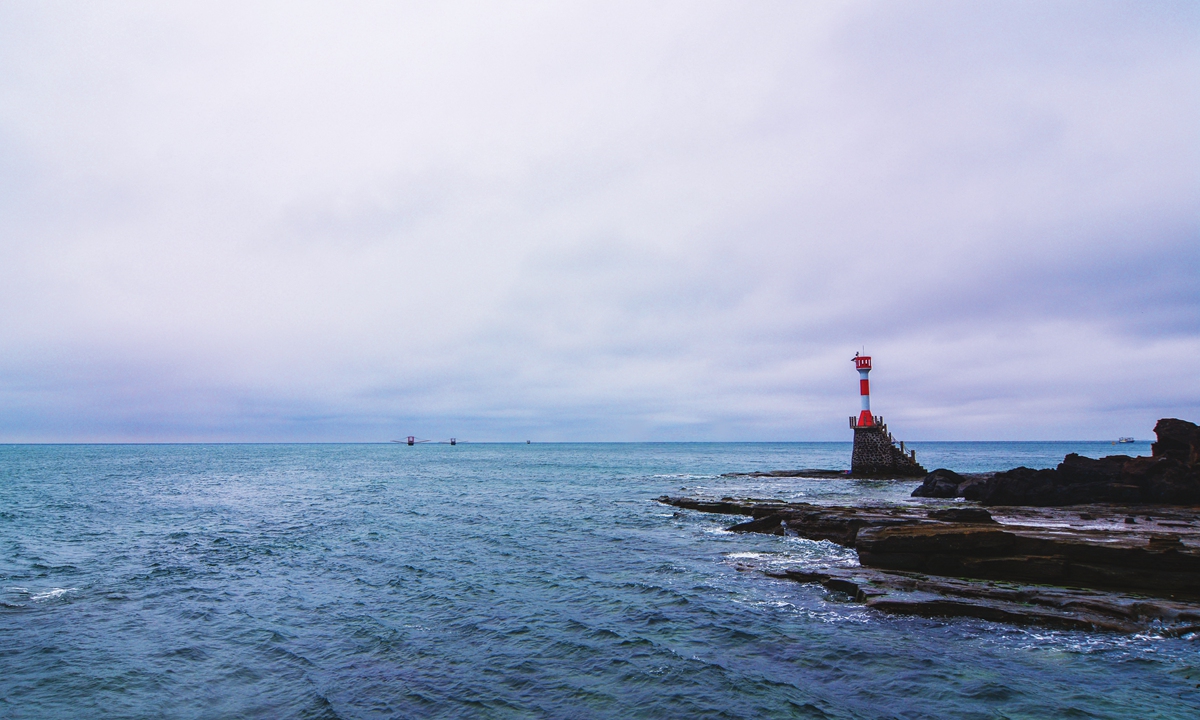
A view of the South China Sea. Photos: VCG
Editor's Note:
Tensions between China and the Philippines in the South China Sea have been bubbling up for some time. At the beginning of 2024, the feud almost flared up with the Philippines continuing its provocative moves and remarks, including the joint patrol with the US and its announcement to develop islands to make them more habitable for troops. Where is the South China Sea situation headed in 2024? Could a conflict be sparked accidentally? In the latest episode of Global Times' Global Minds Roundtable (GT) presided over by reporter Li Aixin, Zhou Bo (Zhou), senior fellow of the Centre for International Security and Strategy at Tsinghua University, Anna Rosario Malindog-Uy (Malindog-Uy), director and vice president for external affairs of the Asian Century Philippines Strategic Studies Institute, and John Pang (Pang), a former Malaysian government official and a senior research fellow at Perak Academy, Malaysia, shared their views on these issues.
GT: How do you see the South China Sea situation developing in 2024?
Zhou: It is really disturbing. The South China Sea issue has been there for quite some time. We know what happened and there are agreements among us - the DOC in 2002 and the upcoming COC. As long as negotiations are going on, we are friendly toward each other, and this region would be free of not only war, but also any disturbances. But all of a sudden, the Philippines has made a U-turn and come to the forefront to challenge China in this unexpected way. It is surprising, and confusing to me.
Look at Vietnam. Vietnam also has territorial disputes with China. When I was reading the South China Morning Post, I found a cartoon extremely interesting - the Vietnamese cut the red carpet into two pieces, one for China and one for the US. That is the balance the Vietnamese are trying to strike. Maybe the Philippines should learn something from Vietnam, which gives a good lesson about how to deal with big powers.
Pang: It is actually driven by the US.
However, the US was already defeated by the Taliban in Afghanistan, by Russia in Ukraine, and by the Houthis recently in the Red Sea. It is in absolutely no shape to take on China in the South China Sea. Even having identified China as the No.1 enemy, the US has been incapable of focusing on China, as it has been distracted. Despite what's going on in the South China Sea, they can't afford something blowing up in an election year.
I have enough faith in the maturity and the statesmanship of the Chinese government and the capacity of the PLA Navy to limit any particular skirmish. So at this point, it would be extremely foolhardy for the Philippines to be auditioning to be the next proxy to be destroyed.
Malindog-Uy: Hopefully the contested waters will be relatively peaceful. However, as far as a dispute between the Philippines and China over the South China Sea is concerned, I can sense that it will continue to be challenging. Philippine Secretary of National Defense Gilberto Teodoro Jr. recently stated that the Philippines will continue to conduct more joint patrols with allies like the US. This is expected in 2024 with plans to expand into multilateral exercises.
Nevertheless, according to the recent statement from Philippine National Security Advisor Eduardo M. Año, the current Philippine government is still open to peaceful talks to resolve the South China Sea dispute between the Philippines and China. This is quite a positive statement. However, such a statement should not remain mere words, but should be accompanied by action in the pursuit of active diplomatic and peaceful negotiations and talks with China through diplomatic channels, like the Bilateral Consultation Mechanism between the two countries.
Overall, from my vantage point, the situation in the South China Sea will remain volatile, with possible tensions arising from, first, joint military exercises, particularly between the Philippines and the US and its Western allies; second, navigation challenges; and third, territorial disputes.
Furthermore, the dynamics between China and the US could contribute to a strategically competitive environment in the South China Sea. So when you talk about 2024, the South China Sea is expected to remain tense with diplomatic and military affairs or efforts from regional and global players playing a critical role in shaping the future of the region.
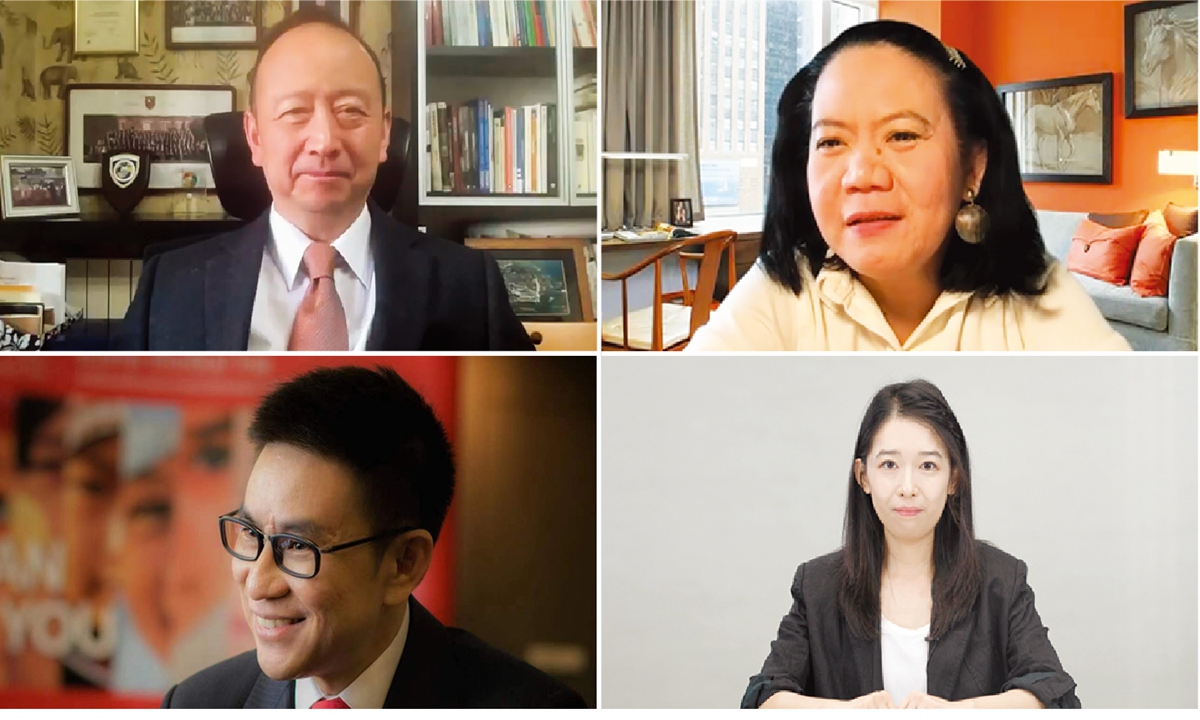
Clockwise from top left: Zhou Bo, Anna Rosario Malindog-Uy, Li Aixin, and John Pang, discuss the South China Sea issue during Global Minds Roundtable on January 10, 2024. Photo: screenshot
GT: In 2016, China issued a white paper noting that the Philippines had promised to tow away the vessel on Ren'ai Reef. Yet the Philippines later denied making this promise and refused to acknowledge it due to the lack of a written agreement. What do you think is the reason behind the shift in the Philippines' attitude from making the promise to denying it?
Malindog-Uy: This question is difficult to answer and very sensitive, because I'm a Filipino. But I will answer it. I'm not afraid of pro-American agents in the Philippines. The dispute between the Philippines and China over the South China Sea, specifically, the issue around the grounded vessel at the Second Thomas Shoal (Ren'ai Reef), is complex and involves multiple dimensions of international relations, domestic politics, and strategic considerations.
The Ministry of Foreign Affairs of China is saying that there was a promise. Some non-Chinese sources are also affirming that the promise exists. For instance, in a November 1999 press conference, then-Philippine defense secretary Orlando Mercado was quoted as saying that "…efforts will be made to immediately remove the vessels from the shoal." Gregory Poling, the director of the Southeast Asia program at the Center for Strategic and International Studies in Washington, revealed in his 2022 book that, and I quote, "when the Chinese government demanded that the ship be removed, President Estrada (then Philippine president), feigning ignorance, promised to tow the vessel away as soon as it could be safely floated off the reef."
The current Philippine government has denied making such a promise, and various Philippine government officials, and former presidents, have publicly stated that no such agreement was made. Also, it seems that there is no publicly available evidence of a documented promise by the Philippines to remove the vessel from the shoal. The conflicting claims from both sides make the situation complicated.
The incumbent, President Marcos Jr., stated that he was not aware of such an agreement and that he would rescind such an agreement if it existed, effectively nullifying any supposed promise given by Philippine officials in the past. So, looking at the situation at the moment in terms of the political establishment in the Philippines, they are asserting that the vessel is in the shoal as a de facto military outpost of the Philippines and serves as a physical assertion of the Philippines' claim and presence in the area.
The Philippines' close relations with the US, especially in military security and defense under the current Marcos Jr. administration, may have influence and may encourage a more assertive stance and posture toward China.
We need to understand that, unlike China, there's no consistency in the Philippines, when you talk about foreign policy. Philippine foreign policy varies significantly with changes in government and political leadership. Under the current administration, the Philippines may have taken a different standard and approach to the South China Sea dispute following a change in leadership.
Obviously, under President Marcos Jr., there was a shift from promising or honoring a promise to a more assertive denial.
Zhou: What Anna has said is really fascinating for me because I can now see the two sides' (view) of the same issue. The fact is, even Philippine scholars like you (Anna), know what promises your government made in the past on this issue. Otherwise, the Chinese government could not have written these remarks in the white paper.
From a Chinese point of view, we are quite accommodating to all ASEAN claimants. Look at the Taiwan question. We said that we will make utmost efforts to resolve it peacefully. But still, there are three conditions in which we might apply non-peaceful means.
But with ASEAN countries, China has never threatened to use force against any claimant. You can tell the difference and how patient we have been. In this case, we really want to solve this problem peacefully. But if the Philippines made a promise, violated the promise, and wants to have a permanent presence on the reef, that goes too far.
We do not want the Philippines to make this kind of installation a permanent military base. In that regard, we're just trying to prevent an escalation of the situation. So my best answer is to let Mother Nature solve this problem. A ship that is not refurbished will become rustier, and eventually, this problem will be gone. If you put in cement and get it strengthened, this will become a bigger issue.
GT: Reports show that at the end of last year, the US military dispatched P-8A anti-submarine patrol aircraft to assist the Philippine Coast Guard in their resupply operations at Ren'ai Reef. Was this for humanitarian operations or does the US have an ulterior motive? How do you perceive the US role in exacerbating tensions in the South China Sea?
Zhou: The US' attitude has changed. In the past, it was quite clear - not taking sides on the issue of the South China Sea. Then they changed from not talking about it to taking some action.
In the South China Sea, American actions are complicated. To begin with, there is close-in reconnaissance and surveillance by American aircraft and drones. Then there are freedom navigation operations, which the US chants about.
I have been asking Americans a question they cannot answer - if the United Nations Convention on the Law of the Sea is so good, why don't you ratify it? If it is not good, why would you be challenging others in the name of it? This is clearly a double standard.
I think American policy toward China is a bit like what Anna has described about Philippine policy. It's not so consistent and stable.
If you look at Chinese policy toward the US, it has been stable. Our country is stable, our leadership is stable. I don't believe we have sent confusing signals. But American policies are so changeable.
Right now, the bigger picture is that because of China's rise, the US sees China as a competitor.
I believe the Philippines opening nine bases to the US was requested by the US. Otherwise, why would the Philippine government make such an offer? It's a request from the US. Then the question is, why would the US ask for nine bases? Is it about the South China Sea? I don't think so. China has not threatened to attack any ASEAN claimant. I think it is more about the Taiwan question.
I can't think of a single reason why the Philippine government or its people would want to be involved in the Taiwan question. This shows immaturity on the side of the Philippine government. Why would you suddenly give nine bases to the US? Just because of some problems on the Ren'ai Reef? Think about it, China can easily stop letting the Philippines refurbish the ship and stop them from getting access to the ship. Then the thing would be over.
Pang: Most recently, regarding the Philippine actions with the grounded ship, if you ask me how these made-for-media antics make other countries in ASEAN feel, I'd venture to say that makes them uncomfortable. Of course, they're not going to reproach the Philippine government in public. The ASEAN way is to raise these matters behind the scenes. Going to the media, playing it up and letting domestic politics run the show, as in the US, would not be the ASEAN way. It results in the inconsistent policy noted by Anna and Zhou. It also damages a key ASEAN concern: ASEAN centrality.
The Philippines is not the only democracy in Southeast Asia. You might think that democracies tend to play these games more, and they tend to demonize their enemies for political effect. But Malaysia and Indonesia are also electoral democracies, and both have maintained a consistent policy toward China over decades.
ASEAN does not want to see a member state placing itself in the service of great power politics, and involving the region in exactly the kind of great power conflict that ASEAN was founded to avoid.
I am also aware of other tendencies in the Philippines. I was in the Philippines when they kicked out the US bases. There is a strong nationalist impulse as well, and that may return at some point. No other country in Southeast Asia has been colonized by the US like the Philippines. It's relevant to remember the US invasion of the Philippines. Spain, its previous colonizer, sold the entire territory and its people to the US. Meanwhile, Filipinos, having other ideas, declared independence (the first in Asia) and resisted the incoming American occupiers. The US invasion that followed killed at least 200,000 people. It was a genocidal campaign. This history does not go away even if the metropolitan elite forget it.
GT: Could a conflict be sparked accidentally between China and the Philippines in the South China Sea in 2024?
Malindog-Uy: It's hard to predict. The tendency for a conflict or a confrontation, especially a military one, is there. There are skirmishes between our navies.
Those running the ships are humans, and usually, humans are prone to error. So, the possibility of an accidental military conflict between the Philippines and China is there. I really hope that the Philippine side will be more cautious and prudent. Instead of making provocative actions, as far as China is concerned, and relying on US promise that it will back the Philippines if there's an attack in the South China Sea, the Philippines should rather pursue a more pragmatic, open-minded, rational dialogue and negotiation with China. I don't think China would back off if a military confrontation happened between the Philippines and China.
I don't agree with the foreign policy of the current Marcos Jr. government in the South China Sea. The situation in the South China Sea is very volatile. Whatever happens in the South China Sea, if a military confrontation breaks out, it would not only be a problem between the Philippines and China. It would be a problem for the whole ASEAN region and the wider Asia-Pacific. I hope this will never happen, in 2024 or the coming years.
Pang: The real instigator is the US. The Philippines can't do much with China if the US is not ready for it. The issue now is where the US stands. One thing is clear, former US Secretary of State Henry Kissinger famously said that it is dangerous to be America's enemy, but to be its friend is fatal. This is a lesson for people in Southeast Asia: As the empire collapses it will extract what it can from its most faithful vassals and throw more proxies into the fire. We have seen Ukraine destroyed, Germany's industrial future sabotaged, Europe's economy and stability blighted and Australia turned into a remote military base.
Zhou: I think the possibility of a conflict is not zero, but it is highly unlikely. China has the strength to stop any Philippine ships approaching the rusted vessel on Ren'ai Reef. Even if they have it furnished or decorated like a five-star hotel, we can stop people from getting into that hotel. The only question is, would the US help the Philippines, like escorting Philippine ships to provide materials and food? I don't think so. I believe the US has made it quite clear that it's in its own interest not to have a conflict with China. So why would the US decide to have a conflict with China because of a rusted ship?
I like what John mentioned about the role of ASEAN. People have been talking about ASEAN centrality. This centrality, however, is conditional, because it rests upon the balance of power of major powers. If the major powers come into a conflict, ASEAN will become the central battlefield, and then ASEAN centrality will be totally gone.
I believe ASEAN centrality is a myth, but a useful myth, because ASEAN members have been playing this role quite positively in bringing together the major powers. It's like a tea house where the host brings all the guests, offers good tea, and lets them sit down and have nice conversations. ASEAN has been quite positive in this regard.
Coming back to my answer, I don't believe that a conflict is imminent or inevitable, and I hope it won't happen at all.
Pang: Whether it's a myth or not, it's really a principle of action, an aspiration rather than a settled achievement. ASEAN tries to maintain its autonomy by being open to all and by engaging with everyone.
I agree that should a war break out, ASEAN becomes a battlefield. And it gets drawn in as a proxy. This is precisely what it is trying to avoid. ASEAN centrality is not just a "realist" type of balancing arrangement in which ASEAN plays major powers off against each other. ASEAN's centrality consists of its diplomatic, geographic, trade and cultural interconnections with various parts of the world. It's a nexus and a point of connection between these regions. But yes, ASEAN is weak in certain regards but the ideal of ASEAN centrality is to turn the "weakness" of not being a military threat to anyone into a source of strength for peace. We can convene the entire East Asian region, for example, because we are neutral and peaceful and avoid bloc politics.
Malindog-Uy: If a conflict were to be triggered in the South China Sea between the Philippines and China, the response of the US and other Western countries would likely be multifaceted, involving diplomatic, economic, and potentially military dimensions. The nature of the response would be contingent upon the circumstances and severity of the conflict and the geopolitical interests of the countries involved.
First, the US and its Western alliance would probably engage in intense diplomatic efforts to pressure both sides, the Philippines and China, to resolve the conflict peacefully and diplomatically.
Second, the US and its allies might employ economic sanctions against China, particularly if China is perceived as the aggressor. Sanctions could be aimed at sectors critical to China's maritime and military capabilities.
Third, the US and its allies could assist the Philippines militarily. The US has a Mutual Defense Treaty (MDT) with the Philippines that could theoretically compel it to assist the Philippines militarily if the latter is attacked. However, the invocation of the MDT would depend on a number of factors, including whether the conflict is deemed an armed attack on Philippine territory, vessels, or forces and the political will of the US administration at the time.
Likewise, the US may work with regional allies and partners, such as Japan, Australia, and South Korea, to form a coordinated response against China. This could involve joint military exercises or patrols and logistical support to the Philippines.
However, the US and its allies, from my perspective, would be careful and wary of the risk of an open military conflict with China. China is a nuclear state and a major global economic power in the world. China is not the China of 50 years ago. It's a completely different China. It's very modern and it has upgraded its military capability. I think the Western alliance knows this. When a direct military confrontation between China and the US happens, it will not just be a regional conflict. It would be a global conflict, a prelude to World War III.
I don't think the US is prepared to have a head-on military collision with China in the South China Sea, or even in the Taiwan Straits. That's why it uses a proxy, and my country, the Philippines, is being used as a pawn or a proxy. I'm always worried that my country, under the current administration, would be an instrument for a regional conflict that could lead to a global conflict. I hope more people like us speak up about peace and peaceful resolution of the South China Sea dispute, and even the Taiwan question.
GT: Is it possible there may be a turnaround in the Philippines' China policy?
Malindog-Uy: As far as the domestic politics of the Philippines is concerned, that would be possible. There would be several factors to look at.
One would be a shift in the domestic political landscape of the Philippines. So it means a change in leadership or significant pressure from the public. This could probably push the administration to reassess the Philippine stance toward China.
Second, if there are changes in the Philippines' relations with traditional allies like the US and a shift in the foreign policy of the Philippines from heavily leaning toward the US to a more balanced and independent foreign policy. The current strengthened alliance with the US particularly regarding military, defense, and security, unfortunately, emboldens the Philippines to adopt a more assertive and aggressive policy in the South China Sea vis-à-vis China.
Economic leverage is a critical aspect of the Philippine relationship with China because China is still the largest trading partner of the Philippines and a very important economic partner. In a way, it can be used as a tool for crisis management in resolving the conflict of interest between the two countries over the South China Sea.
My friends and I are trying our best to try to tell our government that there is a need for rethinking the current approach to the South China Sea dispute. There should be more open discussion, dialogue and negotiations with China rather than provocative actions, and rather than relying on the empty promises of the US. I believe there's always hope.
Pang: Southeast Asia is at the center of what is potentially an Asian Century. There will be no Asian Century if this kind of behavior continues, and we keep getting dragged back into these squabbles, which always end up with these proxies being decimated, with the US walking away to its safety between the two great oceans. The larger context is the focus on development and the welfare of the people of Southeast Asia and the Philippines.
Today, ASEAN is China's largest trade partner. This is not small potatoes. As China's neighbor, it is also a strategically important trade partner, and with a host of people-to-people and cultural links across the region. People are seeing groundbreaking, game-changing developments, such as the building of infrastructure, connectivity and high-speed rail, first to Laos and then to Vietnam, Thailand, and eventually through the Malay Peninsula to Singapore. They will be seeing a greater economic region. Momentous, hopeful changes are underway, but they depend on the maintenance of peace. And they must ultimately be grounded in a different kind of international relations than what we have been captive to, involving the active effort to build a real community of shared prosperity between Southeast Asia and China.
It's time to stop playing silly games in which we end up as colonial proxies, at a moment when we are seeing the tail end of a Western order built on those games. You see people all over the world, in Africa, in West Asia, in Latin America, waking up to the possibilities and asserting their sovereignty.
